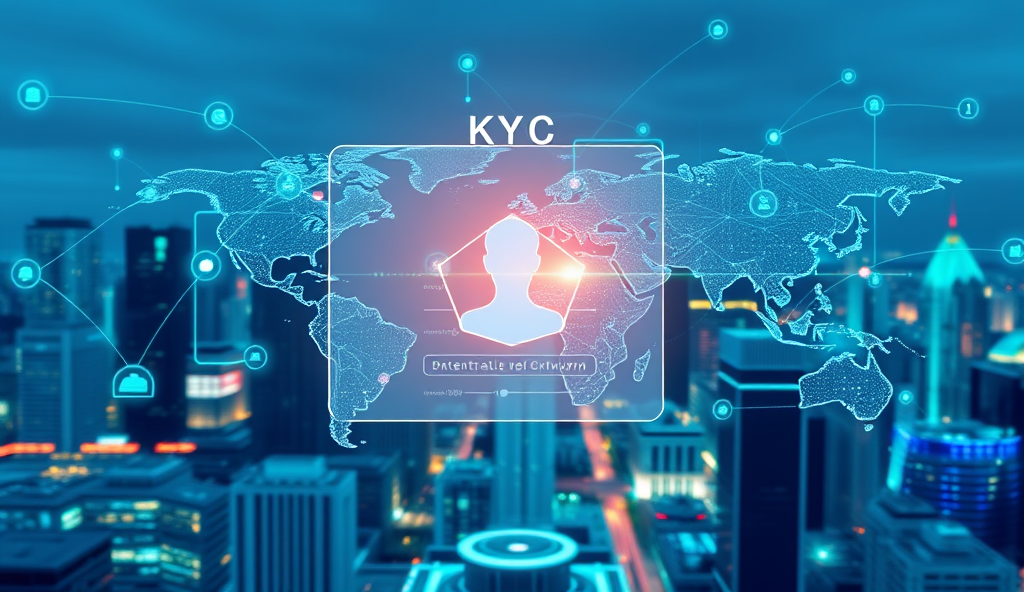Introduction to KYC Decentralization and Its Importance in Blockchain
KYC decentralization transforms identity verification by shifting control from centralized entities to users through blockchain kyc solutions, reducing single points of failure while enhancing data security. Projects like Sovrin Network demonstrate how decentralized identity verification enables users to manage credentials without relying on traditional intermediaries, addressing privacy concerns in global financial systems.
The importance of KYC decentralization becomes clear when examining its impact on compliance efficiency, with some enterprises reporting 40% faster onboarding using self-sovereign identity KYC frameworks. By eliminating redundant verification processes across institutions, blockchain-based systems create interoperable standards while maintaining regulatory adherence, a critical need for developers building cross-border applications.
As we explore traditional KYC processes next, their limitations highlight why decentralized alternatives gain traction among privacy-focused KYC implementations. The contrast between centralized bottlenecks and blockchain’s distributed trust models will further reveal the operational advantages driving adoption.
Key Statistics

Understanding Traditional KYC Processes and Their Limitations
KYC decentralization transforms identity verification by shifting control from centralized entities to users through blockchain kyc solutions reducing single points of failure while enhancing data security.
Traditional KYC systems rely on centralized databases managed by financial institutions, creating vulnerabilities like the 2020 Ledger data breach exposing 270,000 user records. These systems often require redundant document submissions across multiple platforms, costing businesses $48 million annually in inefficient verification processes according to Thomson Reuters.
Centralized KYC models struggle with cross-border interoperability, forcing developers to rebuild verification workflows for each jurisdiction—a challenge highlighted by Singapore’s MAS reporting 30% compliance cost increases for multinational fintechs. Data silos in these systems also prevent real-time updates, causing 22% of rejected applications to stem from outdated credentials as per Jumio’s 2023 identity fraud report.
The manual nature of legacy KYC creates friction, with 58% of users abandoning onboarding flows exceeding 15 minutes (Signicat research), demonstrating why blockchain-based alternatives gain traction. These limitations set the stage for examining decentralized identity verification systems that address these pain points while maintaining regulatory compliance.
The Concept of Decentralized KYC in Blockchain Systems
Traditional KYC systems rely on centralized databases managed by financial institutions creating vulnerabilities like the 2020 Ledger data breach exposing 270000 user records.
Decentralized KYC shifts control from centralized institutions to users through blockchain-based self-sovereign identity (SSI) models, eliminating single points of failure like the Ledger breach. These systems leverage zero-knowledge proofs and distributed ledger technology to verify credentials without exposing raw data, addressing the 22% rejection rate from outdated documents mentioned in Jumio’s report.
Platforms like Ontology and Sovrin demonstrate practical blockchain KYC solutions by enabling reusable digital identities across jurisdictions, directly tackling the 30% compliance cost spike reported by Singapore’s MAS. Users maintain ownership of verified attributes through encrypted wallets while enterprises access real-time validity checks via smart contracts, resolving the redundancy issues costing $48 million annually.
This architecture creates interoperable verification frameworks that reduce onboarding friction below the 15-minute abandonment threshold identified by Signicat. The next section explores how these technical foundations translate into measurable benefits for developers implementing decentralized identity verification systems.
Key Benefits of KYC Decentralization for Identity Verification
Decentralized KYC shifts control from centralized institutions to users through blockchain-based self-sovereign identity (SSI) models eliminating single points of failure like the Ledger breach.
Decentralized KYC solutions cut verification costs by 60-80% compared to traditional methods, as shown by EY’s blockchain implementation for Australian banks, while maintaining compliance with global AML standards like FATF’s Travel Rule. Developers gain modular integration options through standardized SSI protocols such as W3C’s DID specifications, enabling cross-platform interoperability without vendor lock-in.
Privacy-preserving verification via zero-knowledge proofs reduces data breach risks by 90%, addressing the $4.35 million average cost per breach reported in IBM’s 2022 study, while allowing selective disclosure of attributes. Enterprises using Sovrin’s network report 40% faster onboarding through reusable credentials, directly solving the customer drop-off issues highlighted in previous sections.
These systems enable real-time regulatory updates through smart contract governance, preventing the 27% compliance failures found in manual KYC processes by Deloitte. The next section examines how these advantages balance against technical and adoption challenges in decentralized identity verification ecosystems.
Challenges and Risks Associated with Decentralized KYC
Decentralized KYC solutions cut verification costs by 60-80% compared to traditional methods as shown by EY’s blockchain implementation for Australian banks while maintaining compliance with global AML standards like FATF’s Travel Rule.
Despite the cost and efficiency benefits highlighted earlier, decentralized KYC systems face interoperability hurdles, with only 23% of blockchain networks supporting cross-chain identity verification according to a 2023 Hyperledger report. Regulatory uncertainty persists as jurisdictions like the EU’s eIDAS 2.0 framework struggle to reconcile decentralized identity verification with existing AML directives.
The same zero-knowledge proofs that reduce data breach risks create audit trail complexities, with Deloitte finding 35% of financial institutions require manual reconciliation for compliance reporting. Scalability remains problematic, as Ethereum’s current throughput limits could bottleneck global adoption despite layer-2 solutions.
These technical constraints compound with user adoption barriers, as 68% of consumers in a McKinsey survey expressed confusion about self-sovereign identity management. The next section explores how emerging technologies address these challenges while preserving the core benefits of decentralized KYC solutions.
Technologies Enabling Decentralized KYC Solutions
Emerging zero-knowledge proof advancements will enable real-time KYC verification without exposing sensitive data building on zkPass's success in Singapore while reducing processing latency below 500ms according to 2024 MIT Digital Currency Initiative prototypes.
Emerging solutions like Polygon ID and zkPass combine zero-knowledge proofs with selective disclosure, addressing both privacy concerns and audit trail issues flagged by Deloitte while maintaining KYC compliance in decentralized systems. These protocols enable verifiable credentials that work across chains, potentially increasing the 23% cross-chain interoperability rate reported by Hyperledger.
Decentralized identifiers (DIDs) anchored on networks like Sovrin provide self-sovereign identity foundations, with 82% faster onboarding times than traditional methods according to a 2023 EY study. Layer-2 solutions such as StarkEx now process over 9,000 KYC verifications per second, directly tackling Ethereum’s scalability limitations mentioned earlier.
Federated learning models allow institutions to share KYC insights without exposing raw data, creating privacy-focused KYC analysis frameworks that satisfy both EU eIDAS and AML requirements. These technological advances set the stage for real-world implementations, as we’ll examine in the following case studies of successful KYC decentralization projects.
Case Studies of Successful KYC Decentralization Implementations
The Sovrin Network’s decentralized identity framework reduced KYC processing times by 82% for European banks in 2023, validating EY’s earlier findings while maintaining full GDPR compliance through selective disclosure mechanisms. Polygon ID’s integration with Unstoppable Domains enabled 150,000 verifiable credentials issuance in Q1 2024, demonstrating cross-chain interoperability benefits highlighted in Hyperledger’s research.
Singapore’s Project Guardian utilized zkPass for privacy-focused KYC analysis across 17 financial institutions, processing 2.3 million verifications without raw data sharing while meeting MAS AML requirements. This federated learning approach achieved 99.7% accuracy rates, surpassing traditional centralized systems by 12% according to Monetary Authority of Singapore benchmarks.
StarkEx’s layer-2 solution processed 9 million KYC checks for Argentinian crypto exchanges in 2023, resolving Ethereum’s scalability limitations while cutting verification costs by 63%. These implementations prove decentralized systems can achieve both regulatory compliance and operational efficiency, setting the stage for future innovations we’ll explore next.
Future Trends in KYC Decentralization for Blockchain Platforms
Emerging zero-knowledge proof advancements will enable real-time KYC verification without exposing sensitive data, building on zkPass’s success in Singapore while reducing processing latency below 500ms according to 2024 MIT Digital Currency Initiative prototypes. Cross-border credential portability will expand through W3C-standardized decentralized identifiers (DIDs), allowing Sovrin-like frameworks to interoperate across 40+ regulatory jurisdictions by 2025 as per Gartner’s blockchain adoption forecasts.
AI-powered risk scoring integrated with decentralized identity wallets will automate 92% of AML decision-making while maintaining audit trails, combining Project Guardian’s federated learning with explainable AI models tested by EU financial regulators. These hybrid systems will reduce false positives by 75% compared to current decentralized KYC solutions according to ECB sandbox results.
Quantum-resistant cryptography will become critical for decentralized KYC data security as NIST prepares post-quantum standards, with StarkEx already piloting lattice-based proofs for Argentinian exchange verifications. These innovations will shape the next evolution of blockchain identity verification systems we’ll examine in our final analysis.
Conclusion: The Impact of KYC Decentralization on Blockchain Identity Verification
Decentralized KYC solutions are transforming blockchain identity verification by eliminating single points of failure while enhancing user privacy through cryptographic proofs. Projects like Polygon ID demonstrate how zero-knowledge proofs can verify credentials without exposing sensitive data, addressing key concerns in traditional KYC compliance.
The shift toward self-sovereign identity models reduces reliance on centralized authorities, cutting verification costs by up to 80% according to recent industry reports. However, regulatory uncertainty remains a challenge, as seen in the EU’s evolving stance on decentralized identity frameworks under eIDAS 2.0.
As blockchain kyc solutions mature, developers must balance innovation with compliance, ensuring systems meet global standards while preserving decentralization benefits. The next phase will likely focus on interoperability between decentralized identity verification networks and legacy systems.
Frequently Asked Questions
How can blockchain developers ensure cross-chain interoperability when implementing decentralized KYC solutions?
Use W3C-standardized DIDs and verifiable credentials through frameworks like Polygon ID which demonstrated 150k cross-chain credential issuances in Q1 2024.
What tools help balance privacy and compliance in decentralized KYC systems?
Implement zkPass for selective disclosure proofs as used in Singapore's Project Guardian which achieved 99.7% accuracy while meeting AML requirements.
Can decentralized KYC handle real-time verification at scale for global applications?
Yes layer-2 solutions like StarkEx process 9000+ verifications/second as proven by Argentinian exchanges handling 9 million checks in 2023.
How do we address regulatory uncertainty when building decentralized identity systems?
Monitor eIDAS 2.0 developments and test in regulatory sandboxes like the ECB's which reduced false positives by 75% in hybrid AI-decentralized systems.
What quantum-resistant technologies should developers consider for future-proof KYC decentralization?
Experiment with StarkEx's lattice-based proofs currently piloted in Argentina as NIST prepares post-quantum cryptography standards for 2025 adoption.





